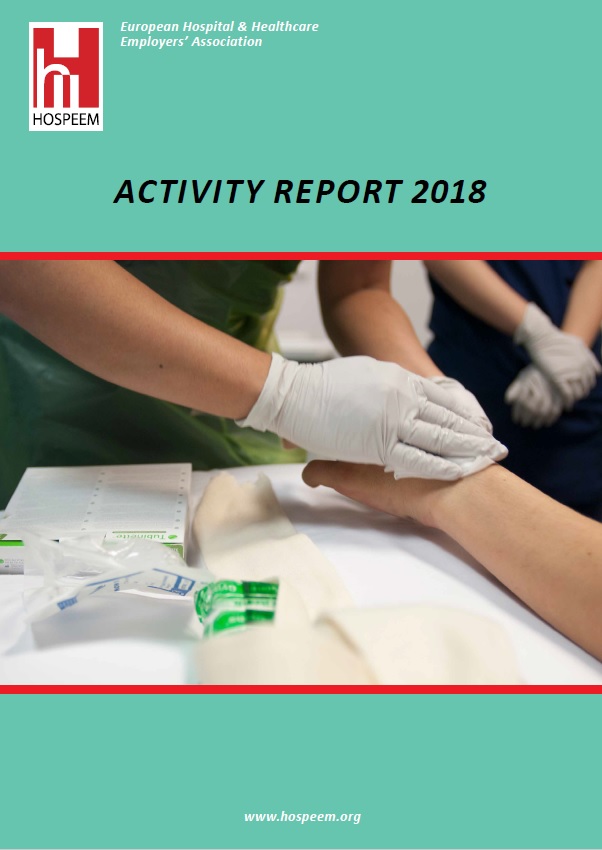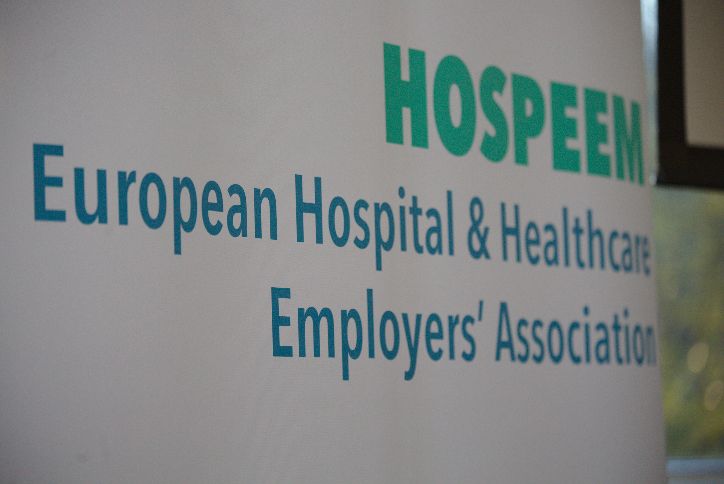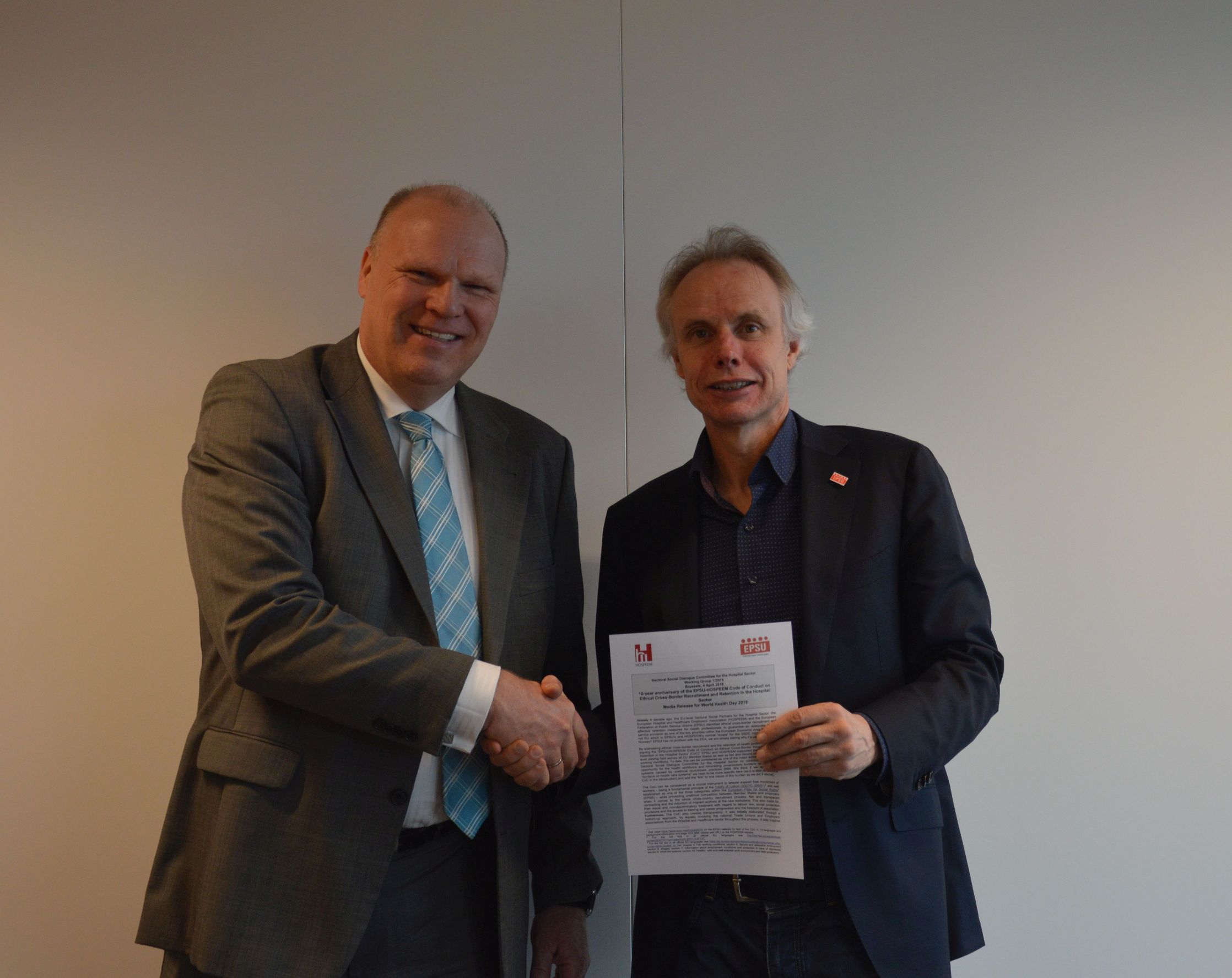The European Federation of Public Service Unions (EPSU) and the European Hospital and Healthcare Employers’ Association (HOSPEEM) have jointly signed a code of conduct on ethical cross-border recruitment and retention.
Through the code of conduct the European social partners in the hospital sector want to address inequalities and unnecessary burdens on healthcare caused by unethical recruitment practices. With this agreement they establish in the European hospital sector social dialogue a full commitment to promote ethical recruitment practices at European, national, regional and local level.
The choice of the world health day 2008 as the date for the official signature of the agreement is not casual. The cross-border movement of healthcare professional is indeed an increasingly expanding phenomenon that clearly goes beyond European borders. With that global scope in mind, the European social partners wish that the code becomes a source of inspiration inside and outside Europe’s borders and remind that, in addition to European and national legislation and collective agreements, the already existing ILO-conventions in this field should be taken into account, when looking for an appropriate framework to support ethical recruitment and retention practices.
The Secretary General of EPSU, Carola Fischbach-Pyttel, added that, “Healthcare services are an essential part of the European Social model, therefore all relevant actors must be committed to their fair and effective functioning. The contribution of health care workers to good quality healthcare is essential. Social Partners therefore need to address the various challenges different countries are experiencing in terms of health workers shortages and the reasons why healthcare workers decide to migrate. Strategies which promote adequate workforce supply in all countries should be supported. EPSU and HOSPEEM want to encourage, and as far as possible contribute to, the development and implementation of policies at local, national and European level with the purpose to enhance work force retention”.
The Secretary General of HOSPEEM, Godfrey Perera stated that, “The promotion of ethical recruitment practices all over Europe clearly calls for a multifaceted strategy, including not only social partners but also governments, regulatory and professional bodies and other relevant stakeholders at local, regional national and European level. However, with the present agreement European social partners also want to firmly commit to their own responsibilities. For instance, when using the services of external agencies only those with demonstrated ethical recruitment practices should be used for cross-border recruitment. In case exploitative practices occur, these agencies should be removed from agreed lists”.
The code of conduct is based upon 12 key principles and commitments:
- High quality health care, accessible for all people in the EU
- Registration and data collection
- Workforce planning
- Equal access to training and career development
- Open and transparent information about hospital vacancies across the EU
- Fair and transparent contracting
- Registration, permits and recognition of qualifications
- Proper Induction, Housing and standards of living
- Equal rights and non-discrimination
- Promoting ethical recruitment practices
- Freedom of association
- Implementation, Monitoring and Follow-up
Background
The launch of the European Social Dialogue in the Hospital Sector in September 2006 was a crucial step in the development of industrial relations in Europe, as it gave the recognized social partners EPSU and HOSPEEM the possibility to take joint actions in the field of human resources, employment and social policies by using the social dialogue instruments. It also gave employers and workers both jointly and individually the possibility to give direct formal input on EU polices affecting the hospital sector and its workers. As employers’ and workers’ representatives we (the social partners) also want to take up our responsibilities as European social partners according to the provisions of article 138 of the European Treaty. Policy initiatives on the field of cross-border health care have many social aspects and will affect management and labour. FULL TEXT:  HOSPEEM-EPSU Code of conduct – EN
HOSPEEM-EPSU Code of conduct – EN
The document will be soon available in 13 languages :
 HOSPEEM-EPSU Code of conduct – FR
HOSPEEM-EPSU Code of conduct – FR
 HOSPEEM-EPSU Code of conduct – DE
HOSPEEM-EPSU Code of conduct – DE
 HOSPEEM-EPSU Code of conduct – BG
HOSPEEM-EPSU Code of conduct – BG
 HOSPEEM-EPSU Code of conduct – CZ
HOSPEEM-EPSU Code of conduct – CZ
 HOSPEEM-EPSU Code of conduct – ES
HOSPEEM-EPSU Code of conduct – ES
 HOSPEEM-EPSU Code of conduct – FIN
HOSPEEM-EPSU Code of conduct – FIN
 HOSPEEM-EPSU Code of conduct – HU
HOSPEEM-EPSU Code of conduct – HU
 HOSPEEM-EPSU Code of conduct – NL
HOSPEEM-EPSU Code of conduct – NL
 HOSPEEM-EPSU Code of conduct – PL
HOSPEEM-EPSU Code of conduct – PL
 HOSPEEM-EPSU Code of conduct – ROM
HOSPEEM-EPSU Code of conduct – ROM
 HOSPEEM-EPSU Code of conduct – RU
HOSPEEM-EPSU Code of conduct – RU
 HOSPEEM-EPSU Code of conduct – SV
HOSPEEM-EPSU Code of conduct – SV
Example for the use and implementation of the EPSU-HOSPEEM Code of Conduct on Ethical Cross-border Recruitment and Retention from The Netherlands:
This table has been elaborated by NVZ (employers), ABVAKABO FNV, NU 91, CNV Publieke Zaak and FBZ (employees) to promote the implementation in The Netherlands :  Table Dutch State of Play – EN ,
Table Dutch State of Play – EN ,  Table Dutch State of Play – NL
Table Dutch State of Play – NL
This presentation by Dutch social partners in the hospital sector describes the transposition of EPSU-HOSPEEM Code of Conduct on Ethical Cross-border Recruitment and Retention (2008) in The Netherlands:  Slides by Elise Merlijn, ABVAKABO FNV, Rolf de Wilde, NU’91 and Tjitte Alkema, NVZ, 1 July 2011 – EN
Slides by Elise Merlijn, ABVAKABO FNV, Rolf de Wilde, NU’91 and Tjitte Alkema, NVZ, 1 July 2011 – EN
Report on use and implementation of the EPSU-HOSPEEM Code of Conduct on Ethical Cross-border Recruitment and Retention (2008)
The document was adopted in the meeting of the Sectoral Social Dialogue Committee for the Hospital Sector working group 3/2012 on 5 September 2012 by EPSU and HOSPEEM.  Final Report Use and Implementation – EN
Final Report Use and Implementation – EN
Other related documents – WHO Code of Practice on the International Recruitment of Health Personnel:
The World Health Organisation Code of Practice was unanimously adopted by the 63rd World Health Assembly in May 2010: WHO Code of Practice (2010) and User’s Guide (2011)
Documents on the implementation of the WHO Global Code of Practice on the International Recruitment of Health Personnel :




 Tjitte Alkema, Secretary General of HOSPEEM reflected on the impact of the Code of Conduct: “10 years ago, our Code of Conduct was an inspiration for the work of the World Health Organisation. Nowadays, given the migration flows to and within the European Member States, it is still very relevant.”
Tjitte Alkema, Secretary General of HOSPEEM reflected on the impact of the Code of Conduct: “10 years ago, our Code of Conduct was an inspiration for the work of the World Health Organisation. Nowadays, given the migration flows to and within the European Member States, it is still very relevant.”
Recent Comments